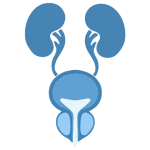Renal cell cancer

The last years due to increased use of diagnostic tools like ultrasound (US) and computed tomography (CT), the number of incidentally diagnosed renal cancers (RCC) is increased. Represents 2-3% of all cancers and has a male predominance with a peak incidence between 60-70 years. Risk factors include smoking, obesity, hypertension as well as first degree relative with RCC. Other factors like occupational exposure to carcinogens and the use of some medicines may increase the risk. More than 50% of RCC are diagnosed incidentally. Findings like haematuria, flank pain and palpable mass are signs of advanced and aggressive disease. Diagnosis is made with CT while MRI sometimes may be useful for disease staging. In controversial cases, when the tumor is very small, when minimal invasive methods are selected for treatment or the disease is metastatic, renal biopsy should be performed to confirm the diagnosis.
Treatment:
-
- Partial nefrectomy when stage, size and position of the tumor allows it.
- Radical nefrectomy
- Active surveillance according to tumors characteristics and patients performance status.
- Minimal invasive methods like radiofrequency ablation and cryopexy.
- Systemic treatment like targeted therapy or immunotherapy in combination or not with surgery for metastatic disease


